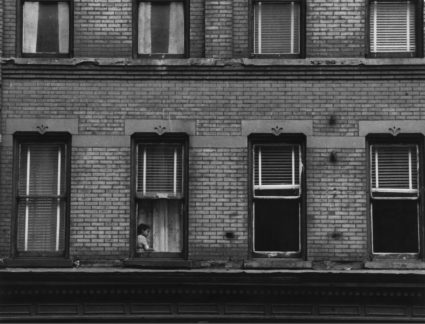Our May 2020 pick for the PBS NewsHour-New York Times book club is Ann Petry's "The Street." Become a member of the Now Read This book club by joining our Facebook group, or by signing up to our newsletter. Learn more about the book club here.
Below are questions to help guide your discussions as you read the book over the next month. You can also submit your own questions for Tayari Jones, author of an "An American Marriage," on our Google form. Jones will answer reader questions about the enduring relevance of "The Street" which was originally published in 1946, on the PBS NewsHour at the end of the month.
WARNING: Spoiler alert on questions further down
- Why do you think Petry chose "The Street" as the title of the book? What does the street symbolize for Lutie Johnson?
- Why does the story of Benjamin Franklin resonate so strongly with Lutie? How does her vision of the American dream change throughout the book?
- What does the coverup of Mr. Chandler's brother's suicide make Lutie realize about the relationship between money, class and race in the U.S.? How does she criticize the white community's emphasis on money? What about the importance of money in American society at large?
- How do Lutie and Mrs. Hedges each represent a different embodiment of the American dream? Were you critical of Mrs. Hedges' work with Junto, or is she simply looking out for own financial well-being?
- How does Petry utilize details of place and setting — such as the weather, or descriptions of Harlem and the apartments in Lutie's neighborhood — throughout the book? How does setting play a role in the life Lutie envisions for herself?
- "I can't see anything ahead of me except these walls that push in against me," Lutie thinks at one point. What sort of figurative walls, or obstacles, does she come up against throughout the book?
- Lutie experiences racism, sexism and poverty throughout her life. Does she find any one of these forms of oppression more intolerable than the other, in your view?
- At one point in the book, Lutie thinks to herself that she hates white people, and will always hate them. But then, Petry writes, "she forced herself to stop that train of thought. It led nowhere. It was unpleasant." Why does she have this impulse to stop herself from thinking this way?
- How do views of masculinity at the time influence the respective identities of Junto, Boots Smith and Jones?
- Certain parts of "The Street" are told from the point of view of characters other than Lutie, such as Boots Smith and Min. Did this help you to better understand the circumstances of, or sympathize with, these characters?
- Were you hopeful about Min's life after she moved out from Jones' apartment?
- Did Bub's fate make you think about the plight of many young men of color who are born into difficult circumstances today? How so?
- Why does the opportunity to sing at the casino mean so much initially to Lutie? Could you understand why the outcome engendered so much anger within her?
- Was Lutie's retaliation against Boots Smith justified?
- Did you read this as a feminist story?
- Although "The Street" was published in 1946, it feels contemporary in many ways. What themes resonate most strongly with modern day America?
- "The Street" has been compared to Richard Wright's "Native Son." If you have read this book, do you see similarities in the themes of the two works? Differences?
- Although "The Street" was a sensation when first published, it has largely faded from the wider American literary canon. Why do you think this is?
Support Canvas
Sustain our coverage of culture, arts and literature.

